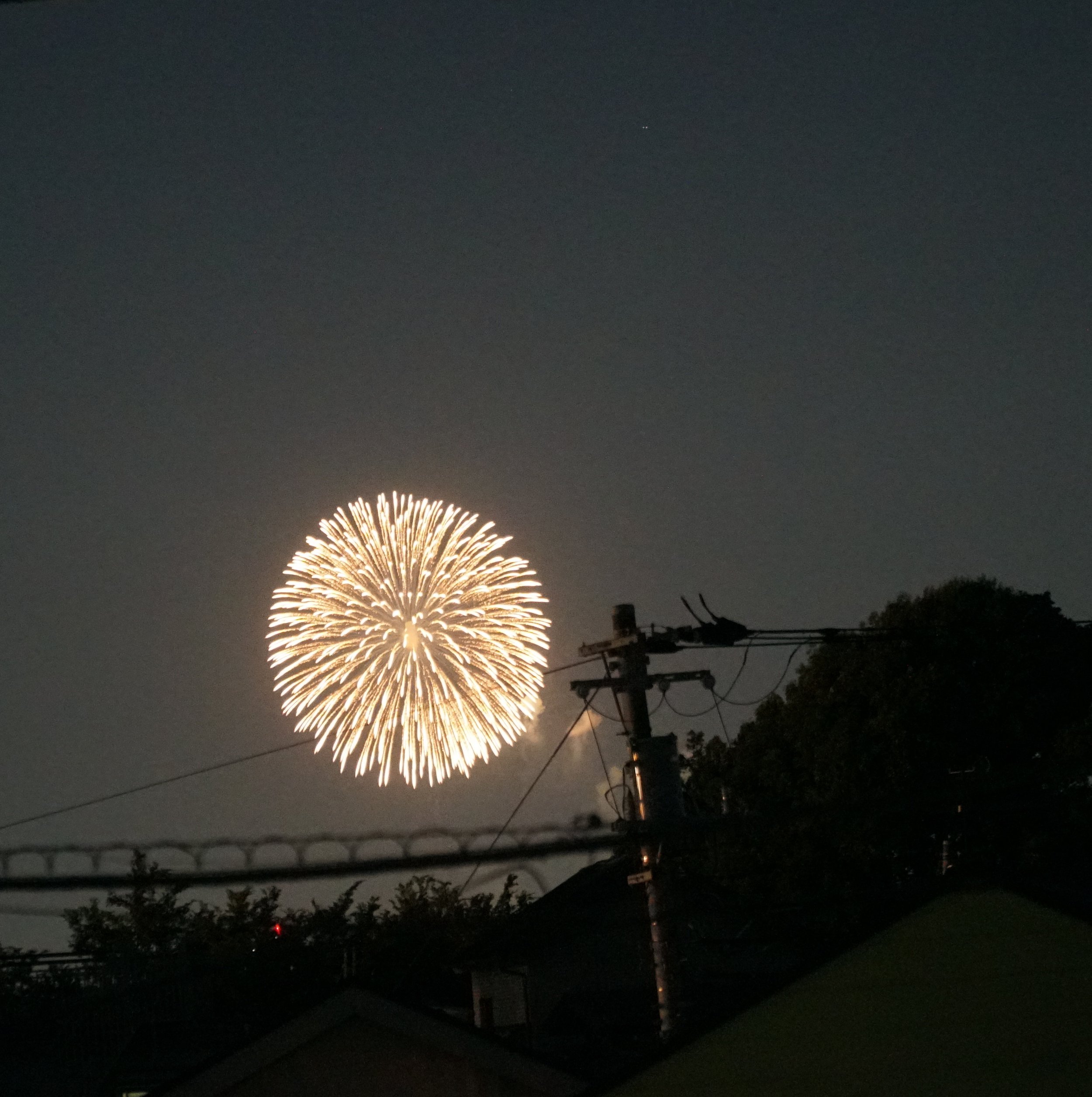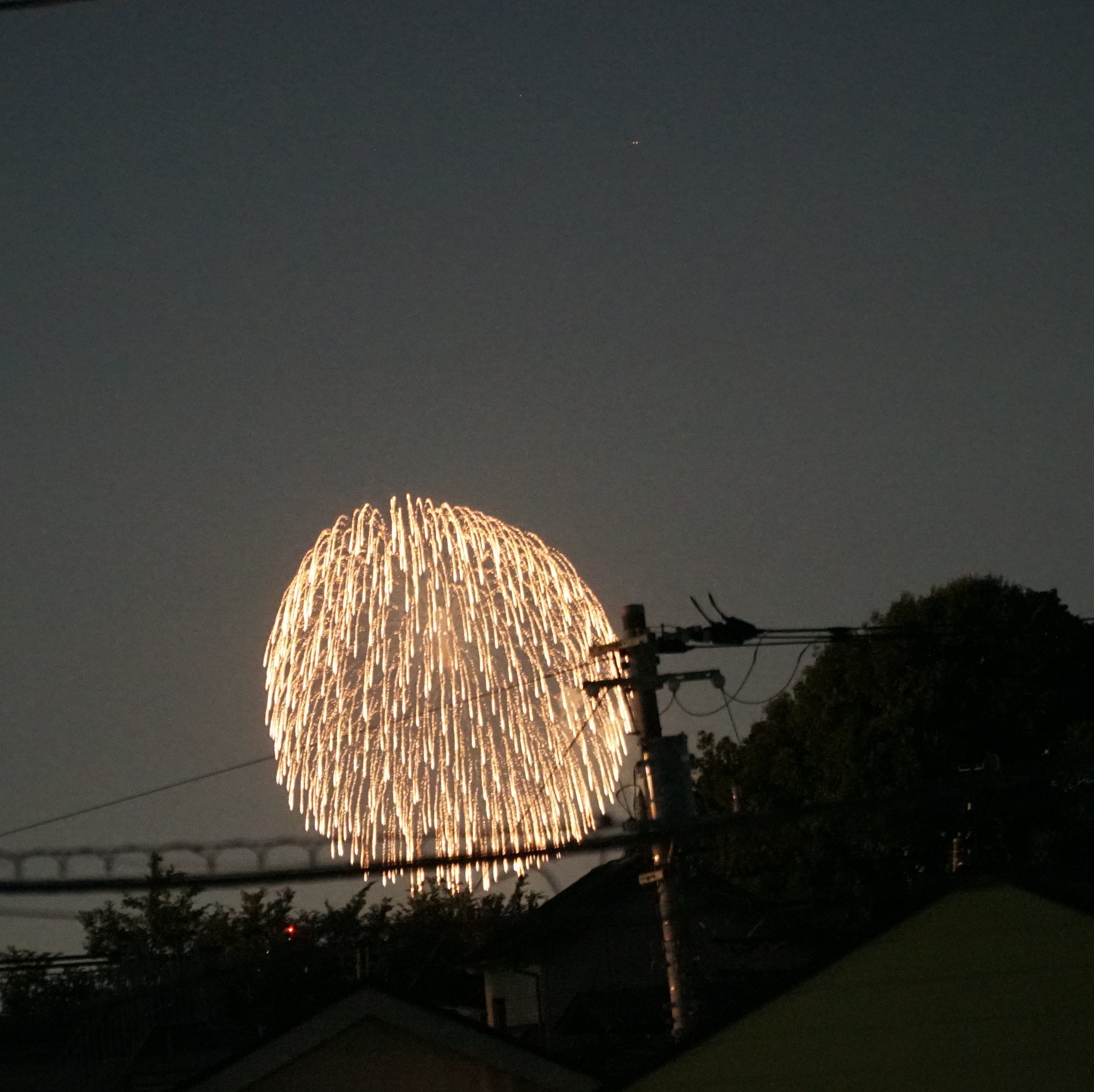Sudden Summer Fireworks
Laying down a couple nights ago on the sofa to read, sweating in the thick summer night, I heard a sound like drumming in the sky, a kind of organized thunder. Fireworks! Summer was here. The fireworks season had begun.
I thought it might be too far away to see, so I lolled around on the sofa with my book, enjoying the sound, wondering where it came from, the stadium, the racetrack maybe, or a far river park, all ten-minute bike rides away.
But as the fireworks continued, I crawled off the couch and climbed to the second floor to peer out from my balcony. Maybe I could catch a glimpse. I waited, and in a few seconds, a white flame shot just over the tops of the trees. Maybe it wasn’t that far, but the angle was wrong. I went back downstairs, out the front door, and down to the end of my street.
A small crowd had gathered there at the top of a pedestrian slope leading down to the park. Large cherry trees used to line the steep slope, but a few years ago, a power line construction project necessitated cutting down the cherry trees at the top. Everyone was outraged, but they were replanted. The new trees were still braced in place, not yet grown too tall to see over.
Standing in the humidity was a fair collection of people. Kids in post-bath loungewear raced around, climbing up on their parent’s shoulders, anticipating the next ka-pow and ooh and ahh. I didn’t look at them much because the shell launches started speeding up, popping higher, tumbling over each other, tattooing the sky. Whatever our age, we squealed in awe and delight, disappointed only to have missed the perfect photo.
Fireworks at Ike-no-hata 1881 Kobayashi Kiyochika
The week before, I’d been too busy to read the local newspaper, so the pop-pop-pop came as a surprise. The sound and sight of fireworks, like the buzz of cicadas and the whir of fans, is quintessential to Japanese summer. But even nicer is having them near where you live, unexpectedly. It makes you feel rich, like owning a place within earshot of the ocean, or with a picture-window view of Mount Fuji.
Unlike the U.S. where I grew up, fireworks in Japan are not limited to one single day. Strangely, that seems to make them more special, not less. On the Fourth of July in my hometown of Kansas City, fireworks were a big part of mid-summer. It was a day we could be a little wild, a little dangerous, blowing things up, and shooting stuff into the sky.
But that was always just one day. Japanese fireworks are spread out over the summer. They were common in Japan long before 1776 was even a glint in the revolutionary American eye. They celebrate independence in the States but form part of the beauty of summer in Japan.
That evening was the Tanabata Festival, a holiday celebrating the meeting of two mythical lovers on the seventh day of the seventh lunar month, when their two stars align. That upped the romance level. But in Japan, almost any summer-y anything could serve as reason for a local display. In the Tokyo-Yokohama area, you could almost see fireworks once a week during the hottest summer months.
I’ve been to some of the big fireworks displays in Japan. I loved watching the Kamakura fireworks from the beach, the reflection off the water doubly spectacular. The Sumida River Fireworks, which one million people attended for the first time in four years, are the most famous and longest running. But they require walking a long way or waiting in line to get on a crowded train, not to mention preparing bug spray, hand fans, drinks, light clothing, the works.
Sumidagawa Fireworks 1890 Toyohara Kunichika
Outside your home is less an outing than a close, easy comfort. Standing in the dark with my neighbors, almost none of whom I knew, still felt neighborly. We could see the fireworks rise above the tree line. We couldn’t see the initial upward thrust, but once it cleared the treetops, the full bright burst was magnificent, more so with the extra seconds of unseen suspense.
The pop-zing-pop-silence emerged from the constant drone of cicadas like a jazz solo. As each one rose in the sky, it gave me the illusion the fireworks were emerging from the trees themselves, artifice arising out of nature. Trees stay, but fireworks vanish in seconds—the beauty of endurance versus the beauty of the moment, two aesthetic positions side by side.
More neighbors gathered at the viewing spot and joined the chorus of wows and giggles. We were all kids after stretching our necks to follow one or two of the shimmering, lingering rockets. Some kids had not seen fireworks for the last few years, maybe at all, because of the pandemic. Their exclamatory questions bounced around the adult ears like whispers of summer mysteries to come.
With child's eyes, the colors seemed more fun. With our eyes adapting between dark and light, it was hard to fully take in all the colors flipping so fast from white yellow to neon green, electric red to teal, turquoise and violet. Colors went by too fast to identify, to remember, to think more than, “I liked that one,” before they succumbed to gravity, dribbling, twinkling, glittering back to earth. Maybe beauty never lasts.
The internet tells me it’s barium green, copper blue, strontium red, sodium yellow, and a mix of titanium, zirconium, and magnesium for silvery white. One can imagine the sophisticated construction of the shell, the chemical combinations and tricks to set the precisely timed bursts, but it hardly matters. Fireworks are one of those things where knowing the science doesn’t add much. More than a technological miracle, they are a celebration of the unpredictable. It’s an aerial application of color to the biggest canvas of all—the dark night sky.
Fireworks seem more primal than other cultural forms. Maybe it’s the redirection of gunpowder from its usual horrible purposes into something so overwhelmingly beautiful. One wonders, as always, why technology so often goes wrong and the beautiful side loses out? Fireworks are when the good guys win, for once, when technology faithfully serves creativity, joy, and pleasure. It’s when technology delights, purely.
A week later, just after sunset, I heard the same rumble and pop from the other direction outside my house. I rushed upstairs and looked out the second-floor window and could see them—again—even more clearly, though farther away. The family across the street was leaning out their window, too. We waved.
It was then that I remembered in old Edo times, the fireworks were shot up as an homage to the victims of famine and disease, and as a ritual to drive away future famine and disease. I can understand that. After canceling fireworks for three or four years, that seemed to be no different now.
Fireworks feel like an echo of something even farther back in human history, the little joy in the pop of a spark from a shared fire in some ancient cave. The cold and fear of the inky night become, for a moment, allayed. Night becomes tolerable, safer, and lovely. It’s not that fire is the first technology; it’s more that fire encapsulates the creative spirit.
Of course, I wasn’t thinking about that as I watched the fireworks. I wasn’t thinking much at all. I was whispering, “Sugoi!” along with everyone else. I was too busy learning again to focus on the successive bursts of life’s moments, hoping more are coming, each more amazing than the last.
Summer 2023




